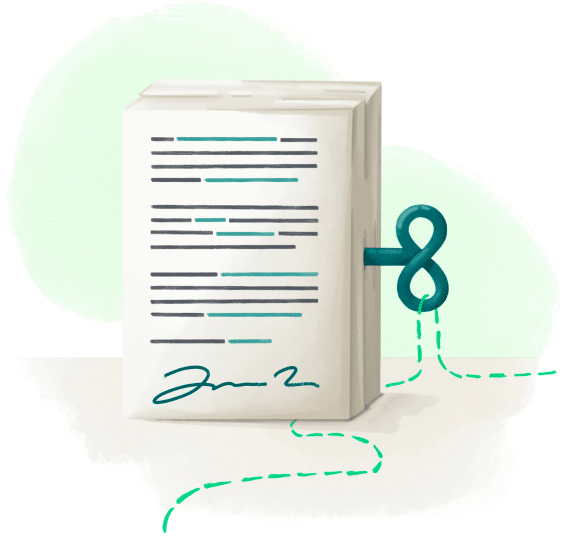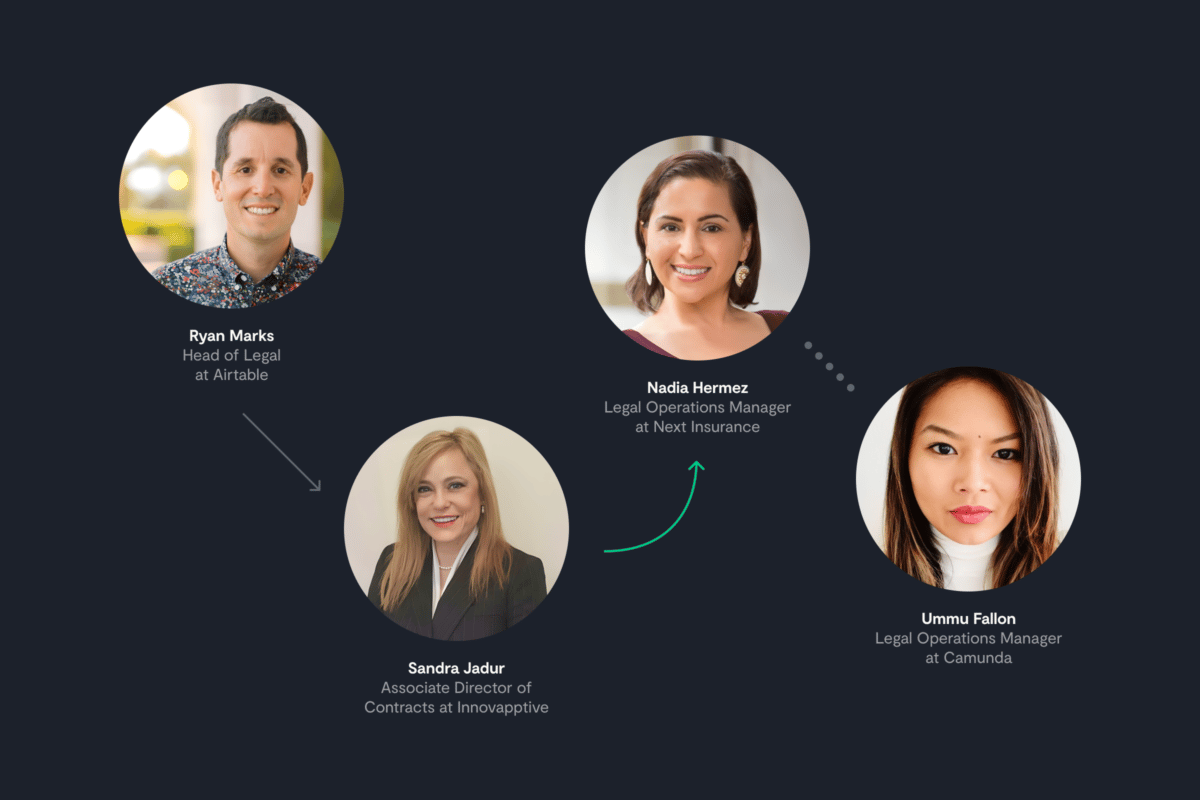You started your career in Big Law. What prompted you to go in-house?
While I was working at Latham & Watkins, I found myself handling a lot of repetitive tasks and I started looking for ways to streamline and automate those tasks so that I could focus more of my time and energy on higher-level, more strategic work. Not only was there an opportunity to streamline these operational tasks at a powerhouse firm like Latham—with all of its resources—but I was increasingly seeing a similar need at the clients we represented, particularly our start-up clients that were more resource-constrained.
I found I enjoyed and had a knack for this type of problem-solving, and I decided to pursue my MBA so that I could take it to the next level. Even in attending business school, it was never my goal to leave law completely. I sensed that the practice of law wasn’t keeping up with technology and that the industry was due for an overhaul. I wanted to be part of that revolution. I ultimately made the jump to in-house because I knew the drive toward operational efficiency in law would be driven by clients who demanded it, not by law firms. Going in-house gave me an opportunity to be more creative than I could have been in another setting.
I ultimately made the jump to in-house because I knew the drive toward operational efficiency in law would be driven by clients who demanded it, not by law firms.
When did you realize, “Hey, legal ops is a thing?”
I had an inkling this was “a thing” by the time I went to business school in 2009. At the time, it didn’t have the name (at least as far as I was aware at the time), but I knew that there was a tremendous opportunity to change the way law is practiced in this country. Apparently, the industry was already moving in that direction. Random tasks that had previously been spread among paralegals and lawyers were now being consolidated and centralized in a single function. The ultimate goal was to enable lawyers to work more efficiently.
You’ve worked at some great brands, from Uber to Instacart and now Opendoor. What are some lessons you’ve learned from leading legal ops at these tech companies?
One of the common threads of these young tech companies is that innovation is crucial. At each company, I’ve been on a mission to do more with less, which has inspired me to tap into my creativity. One of the best things about these environments is that good idea can come from anywhere—from an executive assistant all the way up to the CEO. In that sense, hierarchies aren’t as relevant as they are at more established, traditional companies. Start-ups are looking for good ideas, regardless of who has them.
What are your thoughts on hiring for legal ops? Should it be a first key hire?
I think each company’s needs will be different from the next, but I tend to think that a legal ops hire is a great first hire. Many young companies outsource a lot to outside counsel, so at minimum, a legal ops professional can help project manage those workflows. From the perspective of the legal ops professional, it’s always my preference to start early on with a company so that I have a blank slate. It’s much more fun to be able to build the legal ops architecture than it is to try to remediate systems other people put in place along the way.
One of the traps many young legal departments fall into is selecting a technology solution without understanding whether it will actually solve a problem. I like being on the front-end of as many of those evaluations as I can so we aren’t just buying and implementing shiny new things, but rather ones that will really save us time, money, pain, or all of the above.
One of the traps many young legal departments fall into is selecting a technology solution without understanding whether it will actually solve a problem.
As you grow your team, how do you evaluate where to allocate headcount?
I think it’s appropriate for different companies to think about this differently.
For companies like Opendoor that operate in highly regulated spaces, we tend to devote headcount to roles likely to have the greatest impact in keeping us compliant and responsive to inquiries. For legal ops, this might mean dedicating headcount to roles that reduce the amount of churn of our regulatory and compliance attorneys, or roles that focus on building and maintaining systems that help us manage licenses and permits across multiple jurisdictions.
For a SaaS company, on the other hand, I’d be more inclined to allocate headcount to a contract management function that could support that type of sales-driven organization. It all comes down to taking stock of an organization’s unique problems and solving those. This is an area where one size does not fit all.
What advice would you give to someone considering a career in legal ops?
First, determine it’s the right fit for you. I think highly organized people with a lot of curiosity and a knack for solving puzzles make natural legal ops leaders. If that sounds like you and you are already working on a legal team in another role (e.g., attorney, paralegal, billing clerk, executive assistant), learn as much as you can about other people’s jobs by offering to help with the projects no one else wants to handle. O
One of my good friends and I joke that this is the essence of legal ops—doing what others don’t want to or have time to do. That undersells the legal ops function a bit, but it’s actually great advice for someone looking for a place to start. Jumping into these situations gives them an opportunity to understand a team’s pain points and then get to work solving for those.
What skills does it take to be successful in legal operations?
Organization is probably at the top of the list, with prioritization and planning capabilities close behind. That said, I also tend to highly value diplomatic skills since the legal ops professional has to interact with many different stakeholders across an organization and be able to talk to people in all sorts of different positions in a language that the other person can understand and respond to. We also tend to have to do a lot of persuading when it comes to unearthing additional budgets or convincing stakeholders that a change in process is going to make their lives easier.
Can you share some of the challenges legal faces as the company scales and how you’re working to solve them?
Growth is challenging, and legal departments have historically just added more headcount to deal with that growth. One of the primary goals of legal ops is to help design the best “growth response plan” so that a legal team can grow with the business in the right way. At Opendoor, for example, we’ve implemented technology solutions to help automate workflows. We’ve also simply redesigned some existing processes and workflows to make sure the right work is reaching the right people at the right time. One of my personal goals is to keep in touch with the business and try to anticipate and mitigate potential frustrations and roadblocks that may impact our success.
Want more stories like this?
In your role, technology is a key area of responsibility. How do you set expectations for using technology?
When we implement technology solutions, we usually do it for efficiency’s sake, so we continually redirect people to the technology systems we’ve procured if they try to work outside the process. That means those folks who used to email their contracts to the legal team for review now are directed to submit them through our contract management platform—otherwise, their contract won’t be reviewed. And law firms who submit paper bills are redirected to our ebilling platform—otherwise, their bills don’t get paid. Most people catch on fairly quickly, but some redirecting is to be expected. More often than not, I try to help folks understand how adopting our tech tools will make their lives easier. I like to think we’ve done a pretty good job at implementing solutions that live up to that promise.
On the attorney side, I try to understand where technology might fail us if we rely too heavily on it, and I try to educate lawyers accordingly about where the tech solution’s blind spots might be. I want our attorneys to trust our systems. That means not only educating them about a technology solution’s strengths but also its weaknesses.
How do you drive adoption of the various tools in your tech stack?
I gravitate toward tools with clean, intuitive interfaces that require little user training. Learning a new software—or process, for that matter—shouldn’t require a heavy lift on the part of my internal clients; they’re all busy enough with their day jobs. If I can’t fit all of the instructions a user needs on a single sheet of paper, or introduce the basic functionality of a program in a five- to-10 minute overview session, it’s probably going to be an uphill adoption battle. When I’m demoing a new product, I immediately throw out those that don’t seem intuitive enough to use without extensive instructions.
Where would we find you outside of work?
When I’m not at work, I’m usually in one of three places: out for a long run (I’m currently training for my 15th marathon), on my couch with my cats watching Netflix (I have three cats, all named after characters on Days of Our Lives, none of whom are Instagram-famous, sadly), or at a bar with friends or coworkers (preferably drinking a freshly squeezed margarita).
What are two things people don’t know about you?
Before I entered the legal industry, I studied counseling and psychotherapy. Nothing could have prepared me better to work with attorneys, who are not always known to be the best communicators or to deal with people in fast-paced, high-stress environments.
Ironclad is not a law firm, and this post does not constitute or contain legal advice. To evaluate the accuracy, sufficiency, or reliability of the ideas and guidance reflected here, or the applicability of these materials to your business, you should consult with a licensed attorney. Use of and access to any of the resources contained within Ironclad’s site do not create an attorney-client relationship between the user and Ironclad.







